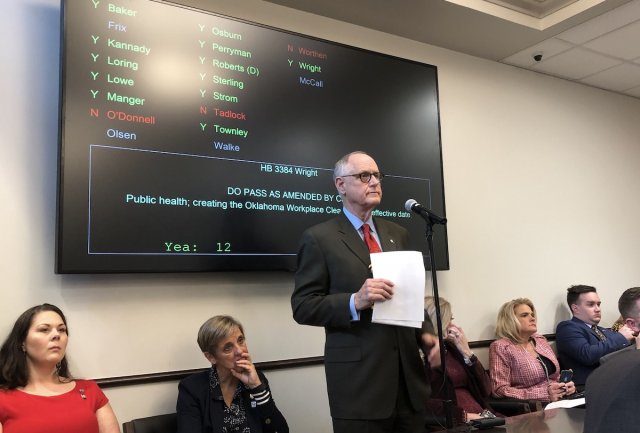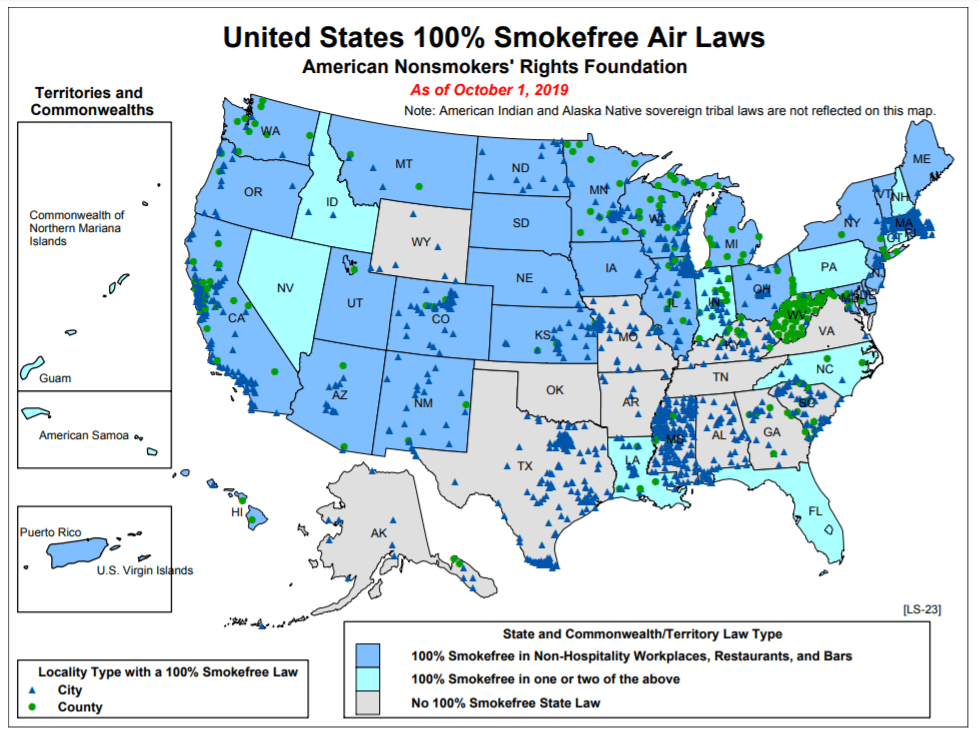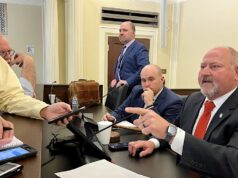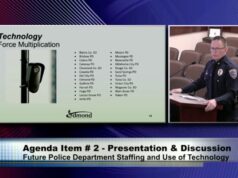

Considering the public health impacts of secondhand smoke, should bars in Oklahoma be able to allow indoor smoking? Should new restaurants be able to open with a separately ventilated smoking room?
Those are the questions House Speaker Pro Tempore Harold Wright intends to pose his fellow lawmakers in HB 3384, which faces opposition from some bar owners, the Oklahoma Restaurant Association and the tobacco industry. Before Thursday’s deadline for moving bills out of their original chamber, Wright’s proposal is expected to receive a House hearing that would make legislators choose a preference between public values: individual property rights or health care costs and outcomes.
“At some point, you say, ‘You know, it’s in the public interest to do something, because it is damaging people’s lives and it is causing our health expenses to go up in Oklahoma,'” said Wright (R-Weatherford) after a Feb. 26 presentation to health care advocates. “I think you have to make a decision on the damage something causes, like for example seatbelts. Several years ago, there was the argument that people should be able to make that decision in their own car. And it’s proven that the seatbelt law has saved lives. The same thing with texting and driving.”
Regulations mandating seat-belt-wearing — see HB 2791, which also faces a Thursday deadline — and prohibiting texting on the road might have parallels to a smoking ban, but the efforts to pass those measures didn’t face a well-funded opposition to change.
Wright’s HB 3384 (embedded below) would prohibit smoking in any enclosed public place or any indoor recreational area, with a few exemptions:
- cigar bars — 35 percent of revenue from tobacco sales — already in existence as of Nov. 1, 2020;
- retail tobacco stores already in existence as of Nov. 1, 2020;
- vapor shops already in existence as of Nov. 1, 2020;
- restaurants with enclosed and ventilated smoking rooms already in existence as of Nov. 1, 2020;
- and certain private residential businesses that do not feature walk-in customers.
The House’s second-highest ranking Republican who is serving his final year, Wright said those exclusions have appeased some business groups formerly opposed to his efforts. On the other hand, exempting existing businesses has dampened his support among health groups.
“It’s interesting, because on one side of the bill, I’ve got people who aren’t going to help me now because I’ve made some concessions,” Wright said. “That’s frustrating, because to get something through up here, you’ve got to compromise. Your members are put in a tough situation. They’ve got people contacting them, and unfortunately the squeaky wheel gets the grease, so to speak.”
Wright’s bill would also repeal Oklahoma’s preemption statute when it comes to tobacco. That law currently prevents cities and counties from passing any stronger tobacco or smoking regulation than exists at the state level.
Property rights vs. public health rankings
Among skeptics of HB 3384 is Wright’s fellow GOP House member Rep. Terry O’Donnell (R-Catoosa), who was one of three people to vote against the bill in the House Judiciary Committee on Feb. 25.
“My concerns about it were — having been approached by several cigar bars and other establishments that allow smoking in my district — that we were depriving people of an opportunity to go places they were intentionally going because they allow smoking,” O’Donnell said. “I saw it more as a property rights issue than a safety issue.”
O’Donnell said lawmakers should be careful to balance public health concerns with the life decisions of individuals.
“It really is a matter of choice,” O’Donnell said. “We could legislate that everybody who goes swimming — whether in their own pool or a lake in the state — wears a life jacket, and that would make everybody safer. But at some point it does become a matter of choice.”
Still, Wright’s proposal is expected to receive a House floor hearing by Thursday’s deadline, according to House Majority Floor Leader Jon Echols (R-OKC).
“It’s the pro tem of the House’s bill, and if the pro tem asks me to hear it, then I’m going to hear it. He has, and I expect it to get heard next week,” Echols said. “I know the pro tem is working very hard with all sides, and I think he is trying to come up with some type of an agreement.”
‘Life or death’ issue hits close to home

If Wright achieves the 51 House votes necessary to advance HB 3384 to the Senate, he will likely do it with bipartisan support.
“The most important thing for me is we rank 48th in the nation when it comes to health outcomes, and we know that smoking is a major contributor,” said Rep. Cyndi Munson (D-OKC). “I do think it is our job as lawmakers to take that into consideration and do whatever we can to prevent people from smoking.”
Munson has a personal reason that she would like to see change.
“My dad suffered a heart attack in 2013. He had been a lifelong smoker, and after he had his quintuple bypass surgery the doctor talked to my sister and me about the importance of him not smoking, but also not going to any bars or restaurants or any locations that allow smoking,” Munson said. “It would be life or death for him.”
Munson joined Wright at a gathering of public health advocates before session on the morning of Feb. 26. After hearing from national researchers who said statistics show most establishments do not lose money when states prohibit indoor smoking, Wright discussed a key reason he is pushing for change.
“The people who work in those facilities, that’s overlooked often,” Wright said. “Being in business, I believe in individual rights.”
Wright owns radio stations in western Oklahoma and said smoking was still allowed in the studio when he bought his first Weatherford station. Eventually, he realized that needed to change.
“Sometimes it’s important to make [a tough] choice, and particularly for those who are in that smoky environment for eight to 12 hours per day,” Wright said.
Casino smoking a complicating factor
Aside from bars, casinos top the list of other commonly smoky environments frequented by Oklahomans. As tribal nations are not under the jurisdiction of the Oklahoma Legislature, Wright’s bill would not affect tribal casinos. Still, the term-limited lawmaker believes passing HB 3384 could add pressure for tribes to prohibit indoor smoking.
“I’ve talked to them. I think if we make this step, it puts a little pressure on them to go ahead and take that step as well,” Wright said. “I hear a lot of complaints. I was talking to a guy the other day who doesn’t want to go to a particular casino because he has to walk through all the smoke to get to a smoke-free part of the casino. So if we as a state make that decision, I think tribal leaders are willing to look at that and do the same thing in the casinos.”
But at a December press conference featuring representatives from dozens of tribes, some leaders said their customers’ desires drive the decision to offer indoor smoking.
“It will be an ongoing conversation,” Matthew Morgan, chairman of the Oklahoma Indian Gaming Association, said at the time. “That subject has not come up specifically (during gaming compact discussions), but it’s not something that is unknown to any casino operations team, and tribal leadership understands that. We will continue to monitor the situation, and if the market demands change, I think you would see them follow heed.”
Oklahoma and tribes are currently caught in court-ordered mediation over whether the Oklahoma Model Tribal Gaming Compact automatically renewed Jan. 1. But Wright said that if negotiations on sportsbook and exclusivity fees ever actually occur, incentives for smoke-free casinos could be in everyone’s best interest.
“I think that should certainly be a discussion topic of what they could do to help casinos conform to other state laws in relation to smoking and age limits and things like that,” Wright said.
O’Donnell said he believes tribal leaders are “as vested in the health of Oklahoma as the state government is.” However, he said he worries about unintended market consequences from Wright’s bill.
“We have a lot of people going to casinos, which don’t really fall under this legislation,” O’Donnell said. “So are we unintentionally driving business away from legitimate establishments in our districts?”
Munson, meanwhile, said she has not spoken with tribal leaders about Wright’s bill. But she believes tribes understand the negative health effects secondhand smoke has on casino employees.
“I think they should be mindful, and I think they are mindful of the health care of their members and their customers who come in and use the casinos and their facilities,” Munson said.
Munson said she understands the feelings of non-tribal business owners who might oppose an indoor smoking ban over concerns about an uneven playing field and a limitation of their property rights.
“I would agree with them, but I also think it’s the right of workers to have clean air and smoke-free air,” Munson said. “I would like to hear from more workers here in Oklahoma who can share their experiences about their health working in bars that still allow smoking. I do think they have the right to breathe in clean air.”
Wright said he has been working hard to find the best possible compromise to improve Oklahomans’ health while respecting concerns of business owners.
“It’d be real easy not to do any bills my last couple of years. This bill is very time-consuming, and it is very stressful,” Wright said. “But I think, as a legislator, if you can make a difference in some area — I don’t really care about getting credit for it — but if I could leave and say, ‘You know, I did make a difference and saved lives in Oklahoma by getting a bill passed,’ there are not too many of those bills out here.”
Wright said he realizes that his proposal may be asking the House’s large freshman class to take one of its toughest votes yet.
“I think what I would tell those legislators is you have to analyze the situation and do what you think is right. If you can go back to your constituency and explain your vote, I think most people will understand,” Wright said. “That’s been my experience in 12 years when I’ve taken tough votes. I’ve had to tell people I was going to vote against a bill or for a bill they didn’t like, and in the long haul they understand, because I’m able to explain why I voted the way I did. You don’t get anything accomplished up here unless you take tough votes.”
Read HB 3374 from Rep. Harold Wright
